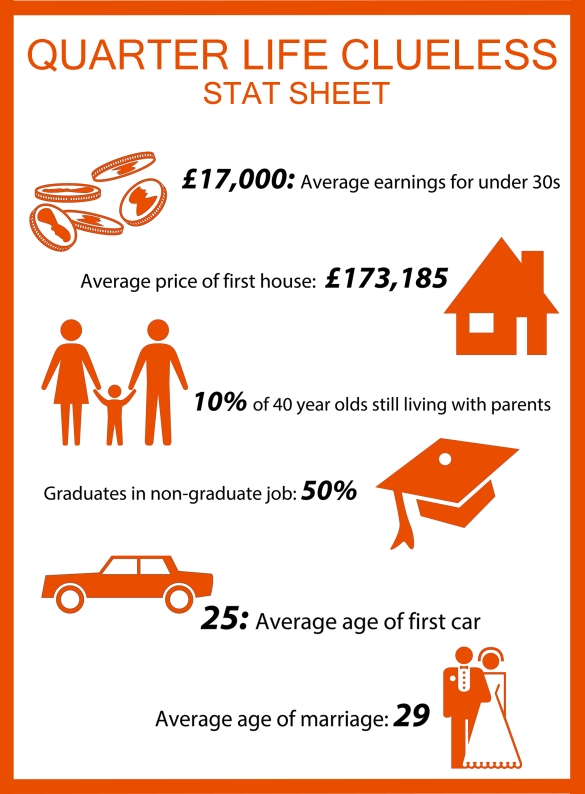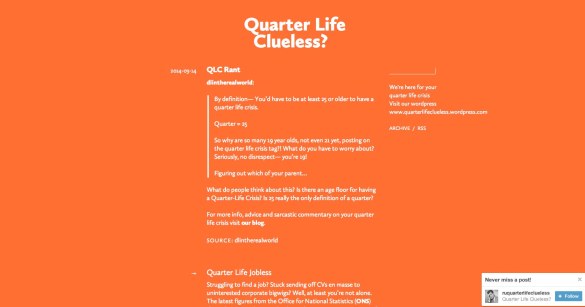Ben is a 22-year-old PPI claim investigator working in London. I sat down with him to talk about childhood, working life and the quarter-life crisis.
Things got a bit depressing…
Ø
Q. Do you feel that you have experienced anything resembling a quarter life crisis?
A. I’ve heard of this being a thing and I know people who have definitely gone through a crisis at our age but I can honestly say I haven’t. This might be because I don’t spend a lot of time analysing my life or maybe I’m just lucky.
Q. Do you feel that your best years are behind you?
A. Wow, are you trying to make me have a crisis? No I don’t, I’m in my first stable relationship and have only just properly flown the nest. It’s hard work being an adult but the rewards are much richer.
Q. Now that you’re a certified adult do you have any fixed long term goals?
A.This is a bit cliché and could be construed as avoiding the question but I just want to live a life which I can look back on and be satisfied with. I suppose that’s everyone’s goal really but it makes sense doesn’t it? People can strive all their lives to achieve things and be miserable. People can accomplish amazing things and still be miserable!
Q. Do you believe hard work is the key to success?
A. My dad always said “with hard work you can achieve anything” but I think we all know that’s bullshit. Returning to the previous question my goal is essentially reached through doing as little hard work as possible. No one looks back fondly on a life toiling away at a computer screen. It’s what I do out of work that will enrich my life.
Q. Does the prospect of settling down into a job for life appeal to you?
A. Aspects of that life certainly appeal to me but at this point in time I’d rather not think about it. I’d much rather go with the flow and see what life throws at me.
“People can strive all their lives to achieve things and be miserable.
People can accomplish amazing things and still be miserable!”
Ø
Q. Do you feel you have been deceived about the possibilities available to you in adult life?
A. Not necessarily deceived but life choices that satisfy the soul and provide long-term financial stability are, for the most part, unrealistic.
Q. Do you feel that our generation has been mollycoddled?
A. On the one hand we have been more so than any previous generation. On the other hand, support and freedom from parents are vital to developing well-rounded and mentally stable children. I can’t imagine anyone believing that this generation of parents had anything other than the best intentions.
Q. Do you feel that there is a lot of pressure on people to be successful at an early age?
A. Yes. As an 11 year old, you see career guidance councillors in school. We are pressured at 14 years old to condense our options, then again at 16.
By the age of 18 we are told to choose one subject and to exclusively study that for 3 years. This itself drastically reduces our options when seeking employment.
How many people actually know what they want to do in life, especially at such a young age?
“life choices that satisfy the soul and provide long-term financial stability are, for the most part, unrealistic.”
Ø
Q. Do you think social media contributes to people feeling a sense of inadequacy?
A. Yes, but arguably the types of people who frequent social media do so to deal with latent feelings of inadequacy anyway. It’s a vicious circle.
I think that the wider media, in particular celebrity culture and advertising, have a bigger effect than social media on feelings of inadequacy. Both superficially and in terms of comparing our achievements to others.
This is especially relevant when considering the idolisation of money, footballers pop-stars and the rest of it.
Q. Do you think media representations of adolescence/young adulthood have positively influenced your life and aspirations?
A. Justin Bieber has, most definitely. Love that guy. In all seriousness I can’t think of anyone who stands out in my mind as being a role model for me when I was younger. It’s hard to imagine your lives without a reflection of it in film and TV though so it’s a tough question that I can’t adequately answer.
“…people who frequent social media do so to deal with latent feelings of inadequacy”
Ø
Q. Do you think the amount of options available to people makes it more difficult for people to feel more comfortable in their lives?
A. I think so. When you ask most people what their dream job would be it’s usually in a creative field or playing a role in changing the world. People want to improve human existence and have their name secured in history. Yet we all end up in jobs in banks, retail outlets and beauty shops.
If we see these aspirations as being basic impulses drilled into us from childhood then 99.999 per cent of people never get to fulfil their desires. To make things worse we get forced into jobs which we sometimes see as actively making the world a worse place. Of course, I’m not suggesting that children should be told to expect a mundane life and not to aspire to things. That would be awful.
Q. Do you think that generations before us had simpler lives in any sense of the word?
A. The easy answer is yes. But our grandparents, and great-grand parents were killed in the wars. Meanwhile we live comfortably in our homes, 5000 miles away from the bombs. We moan about the complication of life, when in reality, we have abundant food, entertainment and resources. Going to Asda is easier than farming.
I think our naivety makes us believe our lives are complicated, but who’s to say every generation hasn’t felt that way. We can speak to people on the other side of the world, on Skype, live. It’s not that complicated.
“99.999 per cent of people never get to fulfil their desires.”
And on that happy note we finished our interview.



